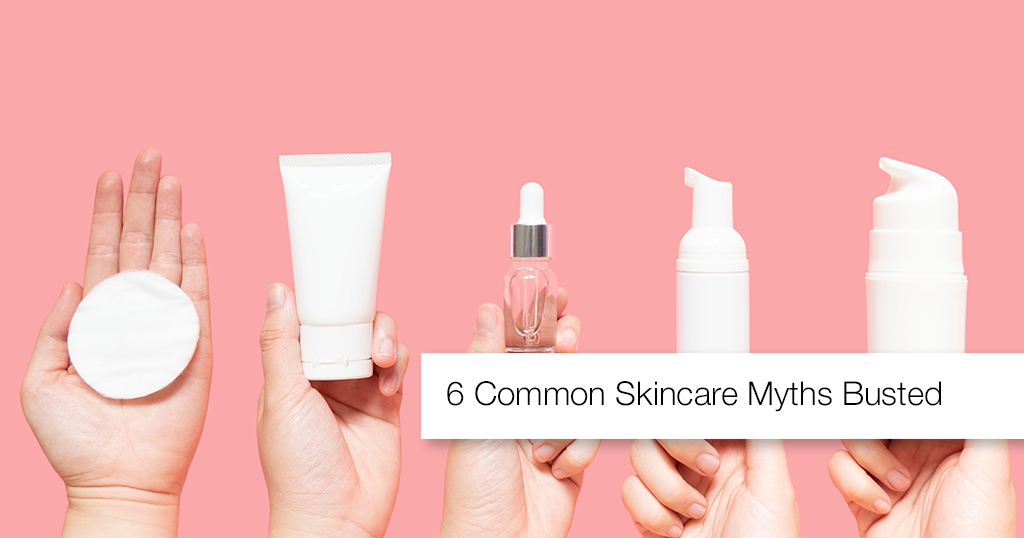Six Common Skincare Myths Busted
In the beauty industry, every day there is something new, making it hard to know what is true and what is false out there. There are many myths on skincare doing the rounds online. We have addressed a few of the common myths and busted them!
Myth #1: The higher the Sun Protection Factor (SPF), the better the protection
It is a myth that SPF is a measure of a sunscreen’s ability to protect against sun’s damaging effects. SPF only measures how well a sunscreen will block UVB rays (UVB causes skin tanning and burning). Like say, if you apply a sunscreen with SPF 30, it implies that you can stay in the sun 30 times longer without burning or tanning your skin than if your skin was bare. For Indian skin, SPF 15-30 is adequate. However, you should ensure that the sunscreen is a broad spectrum one which provides both UVA and UVB protection. Therefore, look for the label, ‘broad spectrum’ while buying a product, or look for ingredients such as zinc oxide, avobenzone, mexoryl, etc. which will offer UVA protection also. UVA rays causes skin ageing.
Myth #2: Microdermabrasion and facials are good for your skin care routine
Studies comprehensively show that facials do nothing more than make you feel good. They can’t reduce wrinkles or improve complexion. Facials can actually damage your face if the aesthetician picks, squeezes or rubs too hard! It can break down elastin and collagen (the skin’s component that adds support and elasticity), so you have to be sure the massage is very gentle. Facials shouldn’t break the skin. The basis of a good facial is to re-establish balance in the skin usually by cleansing, exfoliation, skin analysis, massage and mask.
During microdermabrasion, fine grains of aluminum oxide are forced over the skin under high pressure. This exfoliates dead skin and stimulates collagen production. But people with sensitive skin need to be prepared to see some redness afterwards. Another effective alternative is to use an AHA (Alpha Hydroxy Acid) product. AHAs are great exfoliators and slow the aging process. Recent studies indicate that AHAs may act as free radical scavengers, helping to increase collagen production. In a nutshell, facials and microdermabrasion should be used as and when your skin demands. If you follow a good skin care at home, these might not be required on a regular basis.
Myth # 3: Expensive skin care products work best
A product should not be judged by its cost, but by its ingredients and your requirements. If your skin is oily, no product meant for normal skin, however expensive, will work for you. Routine skin care products like a cleanser, moisturiser, toner and sunscreen should be selected carefully. They should enhance your skin health and should be well tolerated. You might need to change products according to the weather conditions. A summer product might not work
well in winter. You can also take the guidance of your dermatologist, who will assess your skin type, your working schedules, your requirements, budget etc. and prescribe a feasible skin care routine.
Myth #4: You don’t need sunscreen on a cloudy day
You need to protect your skin from UV exposure every day, all the year round. UVB rays, which play a key role in the development of skin cancer, are their strongest in summer between 10 AM to 4 PM. UVA rays, which can cause melanoma, premature ageing and sagging, wrinkled skin, are present during all daylight hours throughout the year, on cloudy or even snowy days! And these rays can penetrate clouds, car windows and clothing. The message is loud enough – wear your sunscreen even on cloudy days.
Also Read About: Squamous Cell Carcinoma of The Skin
Myth #5: Cleansing with soap will keep your skin acne-free
Acne is a disorder of the pilosebaceous (oil) glands of our skin. Adequate cleansing of oily, acne prone skin plays an important role in preventing breakouts. But scrubbing the face frequently with soap will only stimulate the oil glands to secrete more oil, and in turn cause more breakouts! Additionally, soaps are more harmful for sensitive, acne-prone skin because of their alkaline nature. Choose a gentle face wash or a medicated one instead.
Myth #6: Anti-perspirants should be used liberally to prevent sweat associated infections during summer.
During summer, there is a rise in bacterial and fungal infections of the skin. Most of these infections are aggravated due to hot, humid weather, in people with increased sweating, or friction due to obesity, diabetes, etc. Most of the people, especially the youth, use various deodorants, body sprays, etc. to counter sweating and the associated smell. But overuse of such products is not good.
You have to be very selective in choosing a deodorant. Not all deodorants have anti-perspirant properties; most only have fragrance. So look for sprays containing aluminium hydroxide for its anti-perspirant effects. Such products would have standardized chemicals, so branded companies are a safer bet. In case you experience itching, irritation, redness or pigmentary changes, you should avoid their use and consult a dermatologist


















